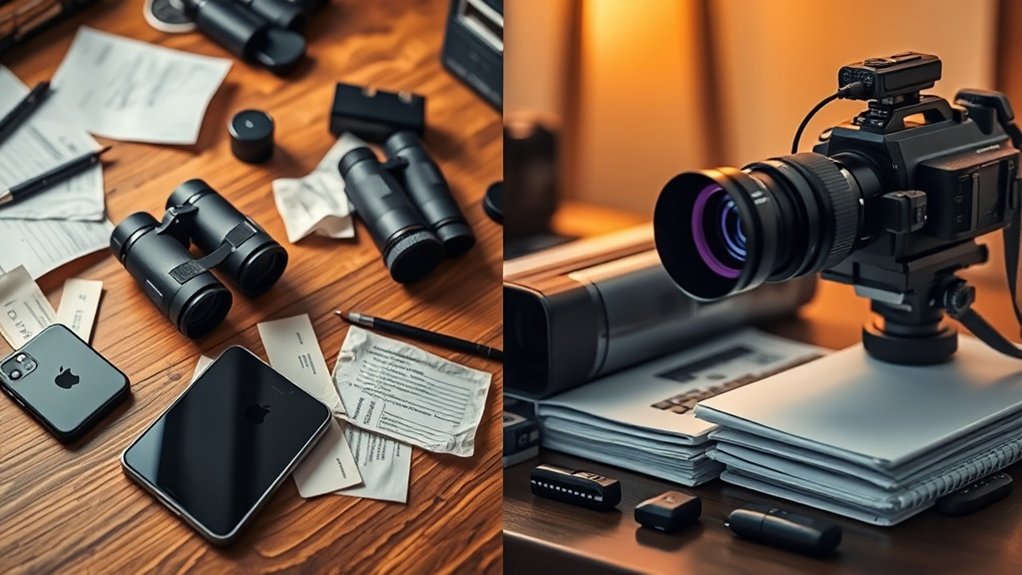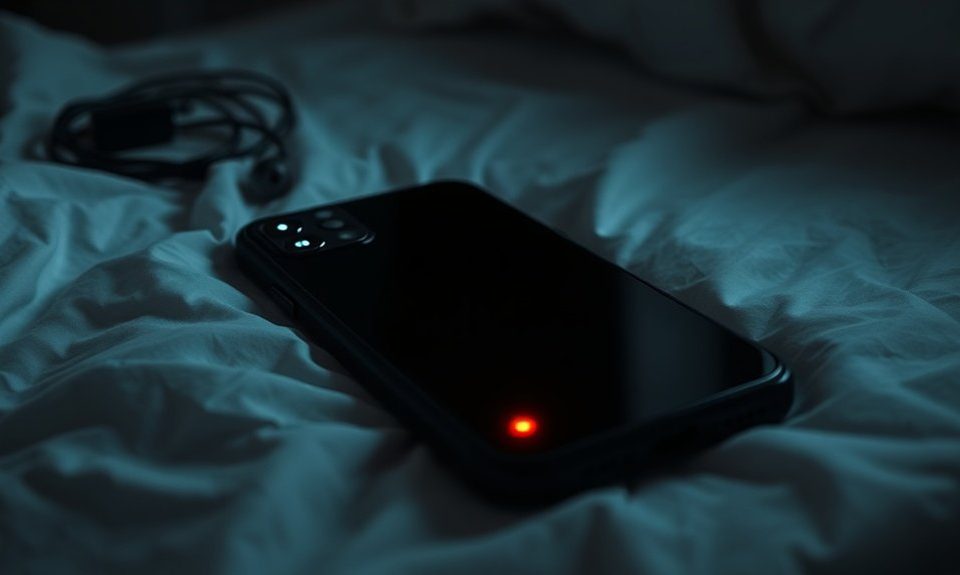While DIY infidelity investigations may appear cost-effective, they often present significant legal risks, emotional challenges, and evidence quality issues that can compromise outcomes. Professional investigators possess specialized equipment, technical expertise, and knowledge of legal boundaries that guarantee admissible evidence while protecting clients from potential stalking charges or harassment claims. The emotional detachment professionals provide prevents clouded judgment and misinterpretation of findings. Complex cases involving digital forensics, anticipated legal proceedings, or safety concerns typically warrant professional intervention to achieve reliable results and proper documentation.
Key Takeaways
- Legal risks increase with DIY methods, including potential stalking charges and evidence tampering accusations that professionals avoid.
- Complex cases involving digital forensics or court proceedings require specialized equipment and expertise only professionals possess.
- Emotional involvement compromises objectivity in DIY investigations, while professionals maintain detachment for accurate evidence interpretation.
- Professional investigators ensure proper evidence handling and chain of custody documentation required for legal admissibility.
- Cost comparison favors professionals when hidden DIY expenses and potential legal consequences are factored into budgeting.
Understanding the Legal Boundaries and Risks of Self-Investigation
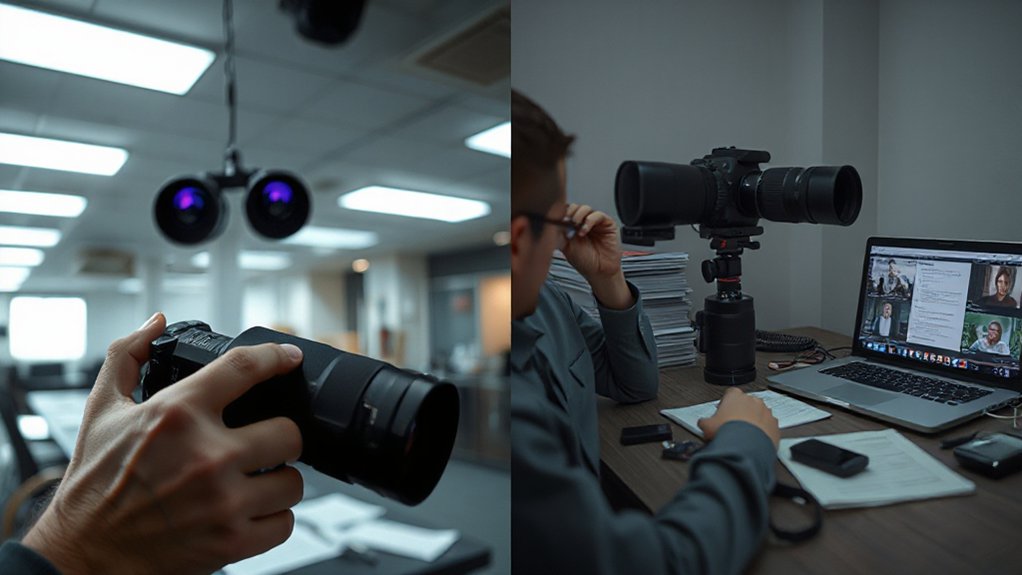
While the impulse to conduct personal investigations may seem natural when facing potential infidelity, missing persons cases, or suspected fraud, individuals must recognize that self-investigation operates within strict legal parameters that vary greatly by jurisdiction. Attempting to gather evidence independently can inadvertently cross into stalking, harassment, or invasion of privacy territories, creating serious legal restrictions that could compromise both the investigation and the investigator’s standing.
The potential liabilities extend beyond criminal exposure to include civil lawsuits from the subject being investigated. Improper surveillance techniques, unauthorized access to private property, or recording conversations without consent can result in restraining orders, financial damages, and inadmissible evidence. These risks often outweigh any perceived benefits of maintaining personal control over sensitive investigations. Furthermore, engaging in methodical evidence-gathering techniques can ensure that the information collected adheres to legal standards, protecting the rights of individuals involved.
Cost Analysis: DIY Methods Versus Professional Services
Beyond the legal complexities of self-investigation, the financial implications present another critical factor in determining the most prudent approach. DIY methods initially appear cost-effective, requiring minimal investment in surveillance equipment, background check services, or digital monitoring tools. However, hidden expenses accumulate quickly through time off work, fuel costs for following suspects, and potential equipment upgrades.
Professional investigators charge $50-150 hourly, with thorough infidelity cases averaging $2,000-5,000. This cost comparison reveals that extensive self-investigation often approaches professional fees when accounting for opportunity costs and potential mistakes requiring case restart.
Effective budgeting strategies involve evaluating case complexity, available personal time, and desired evidence quality. Simple suspicions may warrant DIY approaches, while complex situations involving child custody implications or significant assets typically justify professional investment for reliable, admissible results.
Emotional Toll and Objectivity Challenges in Personal Investigations
Although financial considerations often drive the DIY versus professional decision, the psychological burden of conducting personal investigations presents equally significant challenges that can compromise both mental health and case outcomes.
Self-investigation creates intense emotional distress that clouds judgment and impairs critical thinking. When suspicious partners conduct surveillance themselves, they often misinterpret innocent interactions or miss vital evidence due to emotional overwhelm. The constant anxiety, sleepless nights, and obsessive behavior patterns frequently damage the investigator’s wellbeing and relationships.
Professional investigators maintain objective observation through emotional detachment and systematic methodology:
- Clinical documentation – Recording facts without emotional interpretation or bias contamination
- Strategic surveillance positioning – Maintaining ideal distance for evidence gathering without personal investment
- Analytical evidence review – Evaluating findings through experienced, dispassionate assessment protocols
This professional objectivity guarantees reliable results while protecting the client’s mental health. Additionally, trained professionals understand the importance of legal considerations surrounding privacy laws and evidence admissibility in court, ensuring that the evidence collected is legitimate and useful in legal situations.
Technical Skills and Equipment Requirements for Effective Surveillance
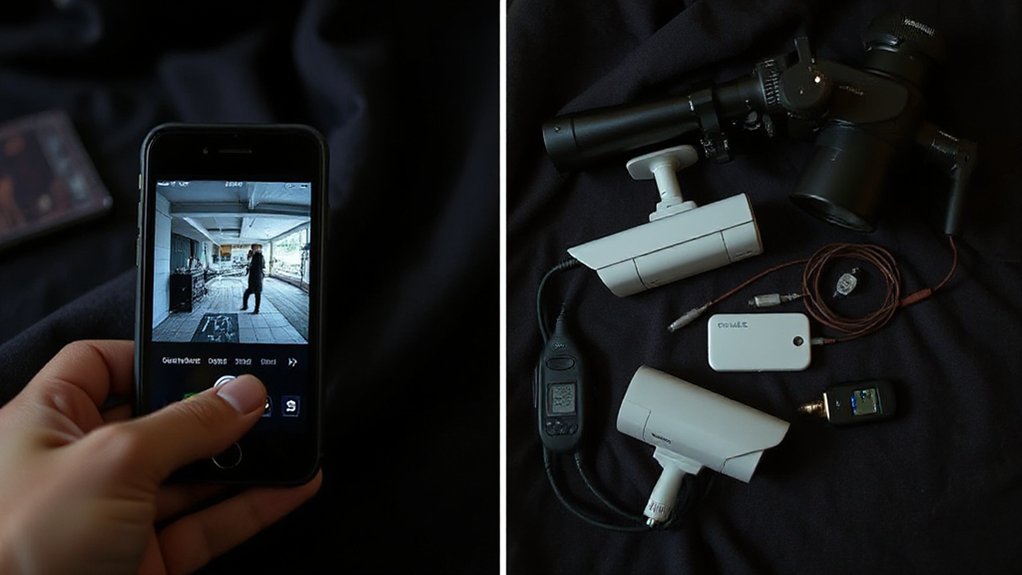
Modern surveillance operations demand sophisticated technical expertise and specialized equipment that amateur investigators rarely possess. Professional investigators utilize advanced surveillance techniques including covert cameras, GPS tracking devices, and long-range photography equipment requiring extensive training to operate effectively. Equipment setup involves understanding ideal positioning, lighting conditions, and legal boundaries that untrained individuals frequently mismanage.
Digital surveillance requires knowledge of software applications, data recovery methods, and cybersecurity protocols. Professionals possess specialized cameras with telephoto lenses, night vision capabilities, and audio recording devices that capture clear evidence from significant distances. They understand technical aspects like battery life management, memory storage idealization, and weather-resistant housing.
Furthermore, covert surveillance strategies employed by professionals ensure thorough documentation of an individual’s movements and interactions without detection, providing critical evidence for fidelity investigations. Amateur attempts often result in blurry footage, missed opportunities, or equipment malfunctions that compromise investigations. Professional-grade equipment represents substantial financial investment beyond most individuals’ budgets, making expert services cost-effective for reliable results.
Evidence Quality and Admissibility in Legal Proceedings
Professional investigators understand that sophisticated equipment means nothing without proper evidence handling protocols that guarantee admissibility in court proceedings. Licensed professionals maintain meticulous chain of custody documentation, ensuring every photograph, video, and digital evidence piece remains legally defensible. Amateur investigators frequently compromise evidence integrity through improper collection methods.
Critical evidence handling requirements include:
- Timestamped documentation – Every surveillance moment recorded with precise date, time, and location metadata
- Secure storage protocols – Digital evidence protected through encrypted systems preventing tampering accusations
- Witness verification – Corroborating testimony from qualified observers during evidence collection
Courts routinely reject amateur-gathered evidence due to authentication failures, broken custody chains, or privacy violations. Professional investigators navigate complex legal frameworks, understanding admissibility standards that protect clients’ interests. Additionally, they often utilize advanced techniques such as photographic documentation of physical injuries to enhance the legitimacy of their findings. When relationship outcomes depend on concrete proof, professional evidence collection becomes invaluable for achieving desired legal resolutions.
Safety Considerations and Personal Security Risks
Surveillance activities expose amateur investigators to significant physical dangers and legal liabilities that trained professionals are equipped to handle. Untrained individuals conducting surveillance risk confrontations with subjects who discover they’re being followed, potentially escalating to violence or harassment charges. Personal safety becomes compromised when amateurs lack proper techniques for maintaining distance and anonymity.
Professional investigators understand legal boundaries, preventing clients from inadvertently committing stalking offenses or violating restraining orders. They possess tactical training for de-escalation and emergency situations that civilians lack. Furthermore, professionals utilize advanced surveillance techniques that minimize risk while ensuring thorough evidence collection.
Beyond physical risks, DIY investigations severely impact emotional well-being. Discovering infidelity firsthand creates traumatic experiences that professionals help buffer through objective reporting. The psychological toll of conducting surveillance while processing betrayal simultaneously often proves overwhelming, making professional intervention essential for protecting both physical safety and mental health.
When Professional Expertise Becomes Essential for Your Case
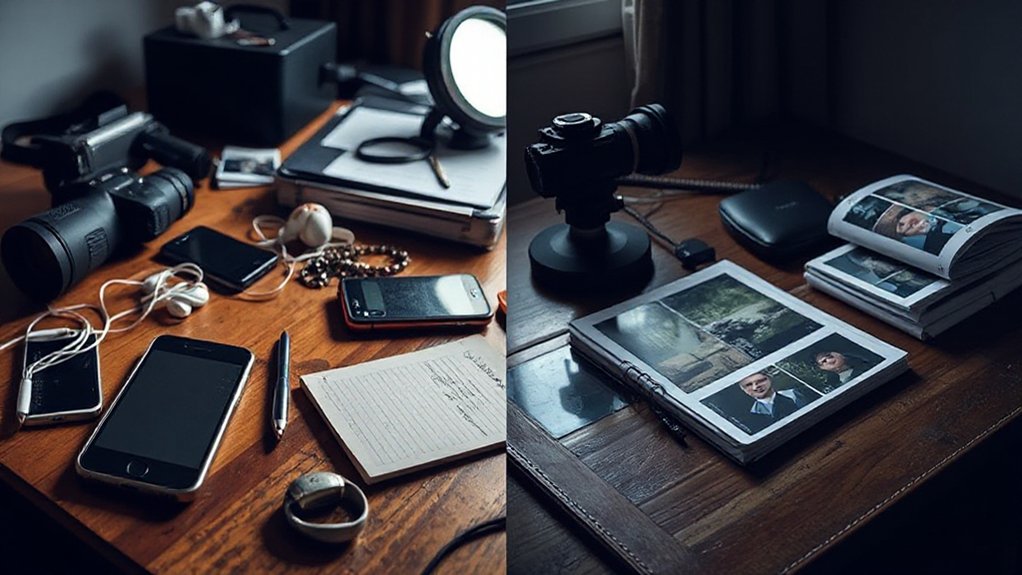
Professional intervention becomes essential when:
- Digital forensics are required – Recovering deleted communications, analyzing metadata, or extracting evidence from encrypted devices demands technical expertise and specialized software.
- Surveillance involves multiple locations – Coordinating extensive monitoring across different venues requires professional networks and sophisticated equipment.
- Legal proceedings are anticipated – Gathering admissible evidence that withstands courtroom scrutiny necessitates proper documentation protocols and chain-of-custody procedures.
Licensed investigators possess training in evidence preservation, legal boundaries, and courtroom testimony. Their established relationships with forensic specialists, technology experts, and legal professionals create advantages that amateur efforts cannot replicate, particularly when relationships involve significant assets or custody considerations. Additionally, their knowledge in digital forensics ensures that all collected evidence meets legal standards for court presentation.
Frequently Asked Questions
How Long Does a Typical Infidelity Investigation Take to Complete?
Investigation duration for infidelity cases typically ranges from one to four weeks, though complex situations may extend longer. A typical case requires sufficient time to establish patterns of behavior, gather evidence, and document activities across multiple occasions. Factors influencing timeline include the subject’s schedule, accessibility, and the specific evidence requirements. Professional investigators prioritize thoroughness over speed to guarantee conclusive results for their clients.
Can I Use GPS Tracking Devices to Monitor My Spouse’s Movements?
GPS tracking devices present significant legal implications and ethical concerns when used to monitor a spouse without consent. Laws vary by jurisdiction, but unauthorized tracking often violates privacy statutes and could result in criminal charges. Even in marital relationships, individuals retain reasonable expectations of privacy. Professional investigators understand these legal boundaries and can advise on lawful alternatives for gathering evidence of suspected infidelity.
What Are the Most Common Signs That Indicate a Partner Is Cheating?
Common infidelity indicators include sudden changes in communication patterns, unexplained absences, and increased secrecy regarding phones or computers. Partners may exhibit suspicious behavior such as working late frequently, creating new passwords, or showing defensiveness when questioned. Emotional distance often manifests through reduced intimacy, lack of eye contact, and decreased interest in shared activities. Changes in appearance, spending habits, and social circles also warrant attention from concerned spouses.
Do Private Investigators Guarantee They Will Find Evidence of Infidelity?
Private investigators cannot guarantee they will find evidence of infidelity, regardless of their investigator expertise. Ethical professionals are transparent about evidence limitations and outcomes. Infidelity may not occur during the investigation period, or a partner might be faithful despite suspicious behavior. Reputable investigators focus on thorough documentation of observable facts rather than promising specific results, as guarantees would be misleading and professionally irresponsible.
Can Social Media Evidence Be Used to Prove Adultery in Court?
Social media evidence can indeed prove adultery in court when properly documented and authenticated. Courts increasingly recognize digital footprint evidence, including messages, photos, location data, and timestamps from various platforms. However, social media implications extend beyond simple posts – metadata, deleted content recovery, and privacy settings all affect admissibility. Professional investigators understand proper collection methods to guarantee evidence meets legal standards and chain-of-custody requirements for courtroom acceptance.
Conclusion
The decision between DIY investigation and professional services ultimately depends on individual circumstances, resources, and objectives. While self-investigation may appear cost-effective initially, the risks associated with legal violations, compromised evidence quality, and personal safety often outweigh potential savings. Professional investigators provide expertise, proper equipment, and legally admissible evidence while maintaining objectivity. Cases involving complex surveillance requirements, legal proceedings, or safety concerns typically necessitate professional intervention for ideal outcomes.
Let us Help
Stillinger Investigations, Inc.
170 Meeting St, Charleston, SC 29401
843-212-1338



